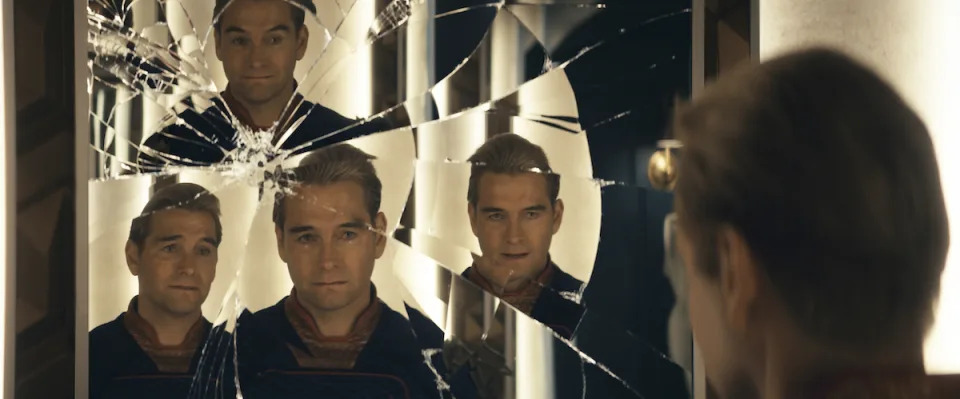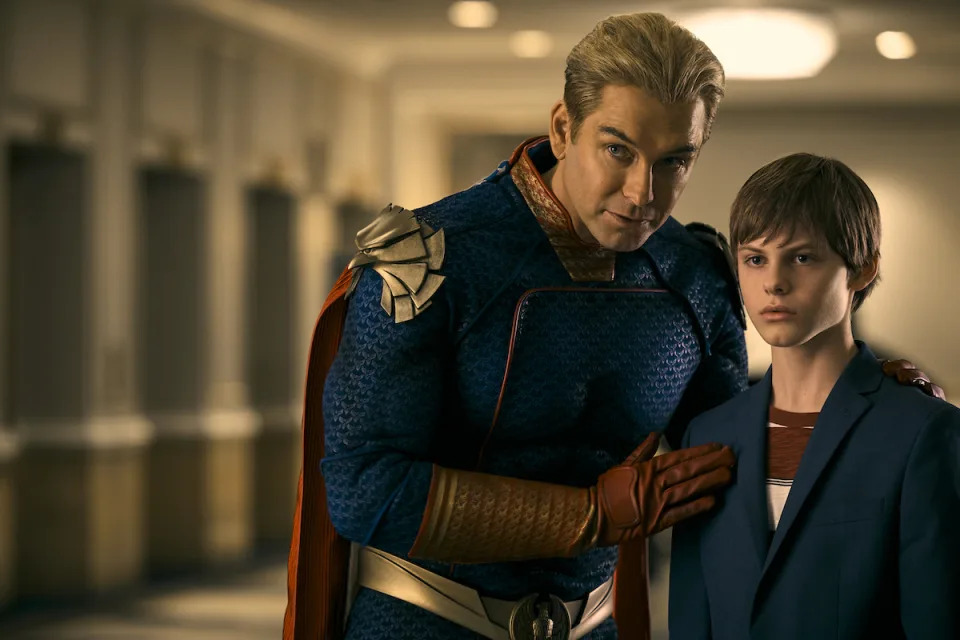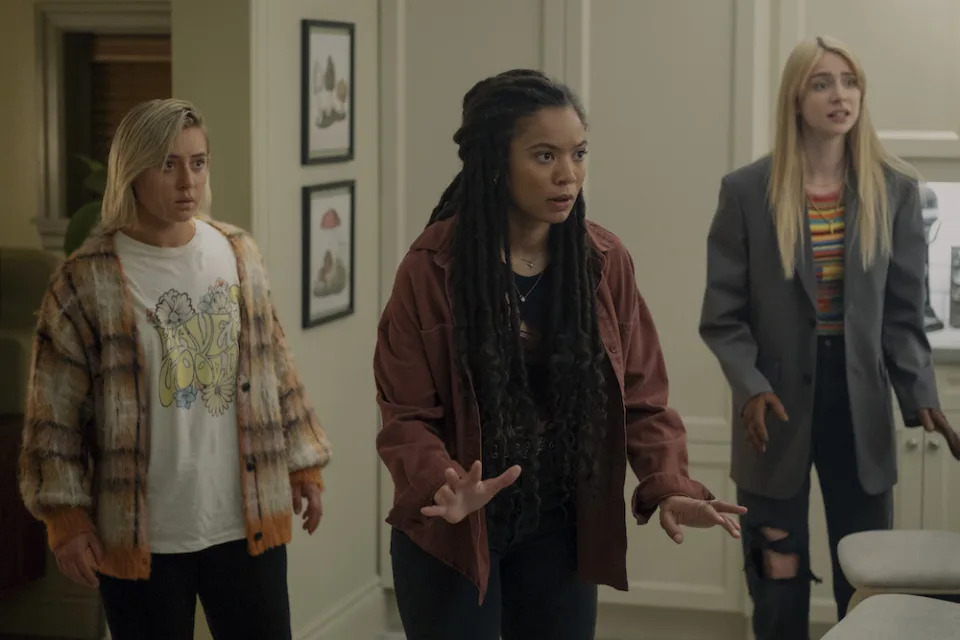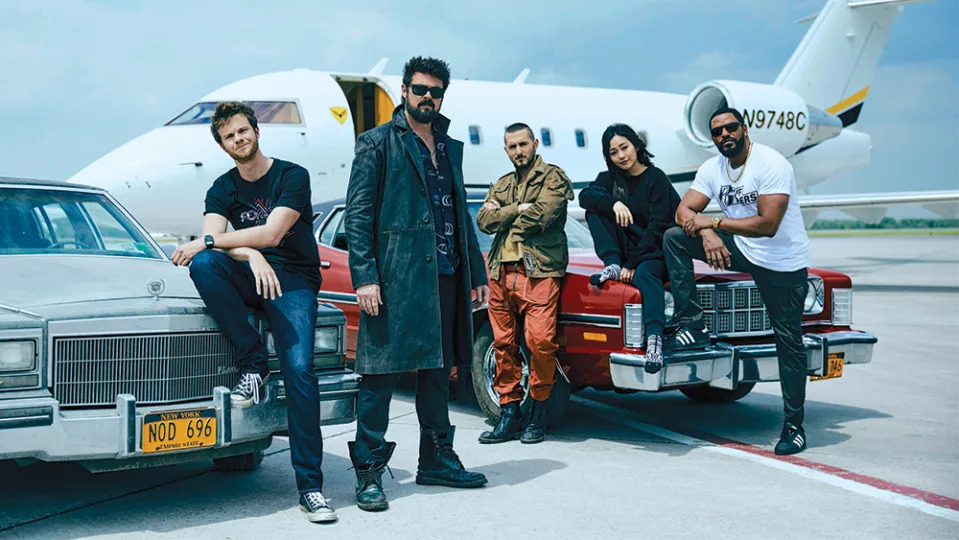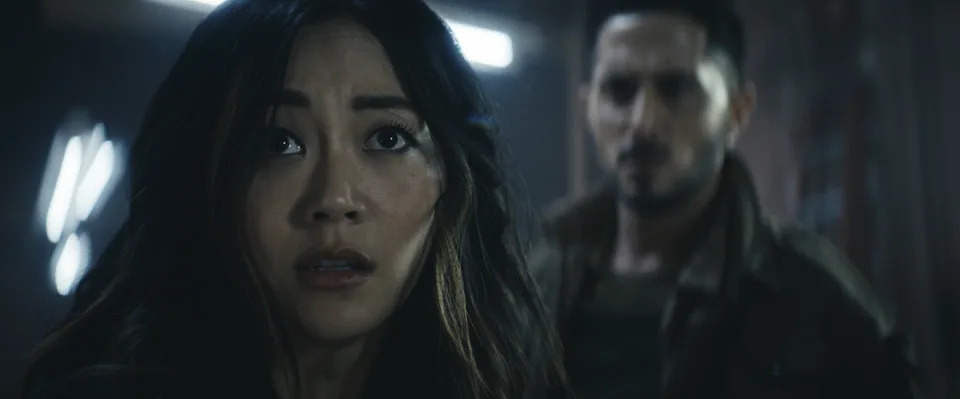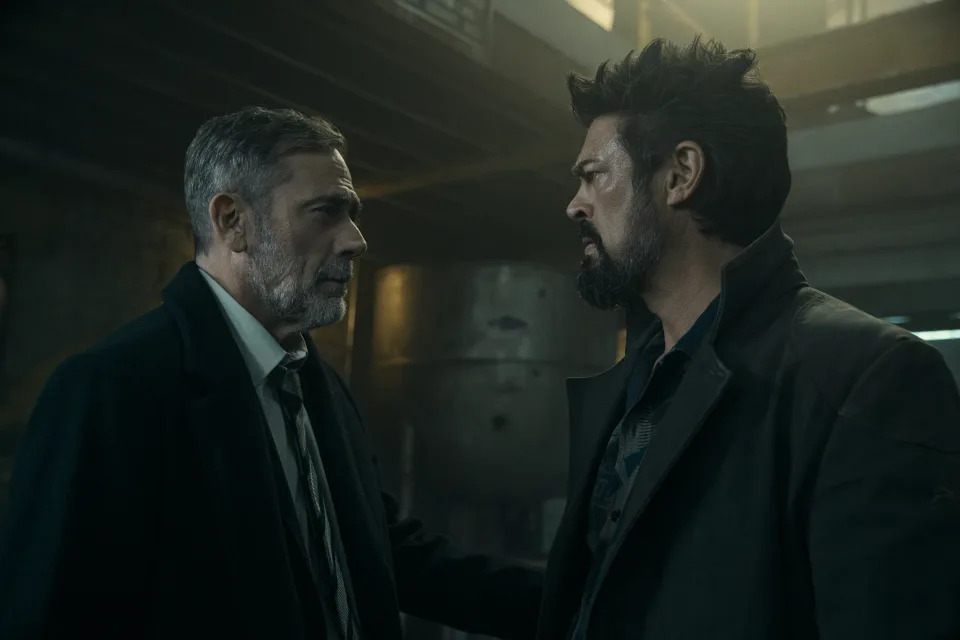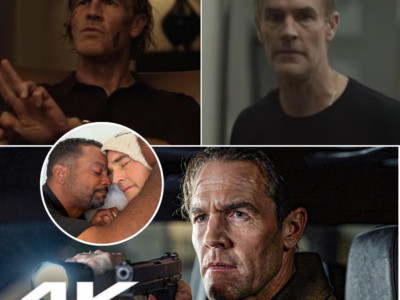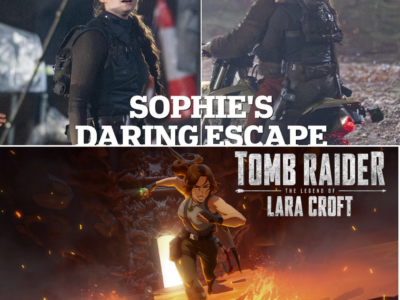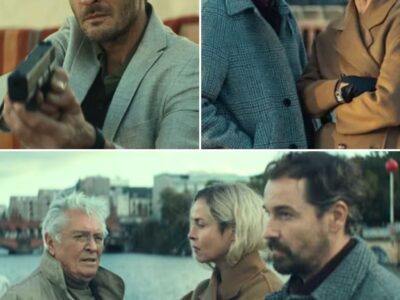Variety’s Showrunners Sitdown: ‘The Boys’ Boss Eric Kripke on Writing to the Actors’ Strengths and Not Wanting to ‘Make Edgelord Material for Incels’
Two days before Season 4 of “The Boys” premiered on June 13, showrunner Eric Kripke announced on social media that the upcoming fifth season of the Prime Video series for Amazon will be its last. Kripke hedged on the question when asked about it for this interview, which took place a few weeks before his announcement; but he did state clearly that he doesn’t want “The Boys” ever to be “turning into the thing that we’re parodying” — that is, an endless stream of superhero content that has flooded pop culture for years.
“It’d be a huge bummer if of all shows, this is the show that sells out,” Kripke said, “so I’m going to try.”
Of course, the end of “The Boys” next season won’t mean the end of the whole universe around the show, which is based on the comics series by Garth Ennis and Darick Robertson. Last year, Kripke and showrunner Michele Fazekas launched Prime Video’s “Gen V” — supes in college! — which is currently in production on its second season. Also in development is a spinoff set in Mexico, among others, Kripke told Variety recently.
But first, we have this fourth season of “The Boys” to watch and enjoy. Homelander (Antony Starr) is firmly in charge of the Seven, as well as Vought, the megacorporation behind the superhero industrial complex. Of course, Homelander is also on trial for murder — having killed someone for no reason in plain sight at a rally in the Season 3 finale — but that’s just a small inconvenience. Meanwhile, secret supe Victoria Neuman (Claudia Doumit) has become the Vice President-elect, and clock is counting down to the election certification on Jan. 6. (“The Boys” is not subtle in its political references.)
As the Boys continue to try to expose Vought and fight Homelander, Hughie (Jack Quaid), Annie (Erin Moriarty), MM (Laz Alonso), Frenchie (Tomer Capone) and Kimiko (Karen Fukuhara) appear to be fighting an uphill battle — especially since their former leader Butcher (Karl Urban) has been sidelined by a death sentence from taking Temp V one too many times.
During this conversation for Showrunners Sitdown With Kate Aurthur presented by FX, Kripke delved into his approach to this season, while also talking about whether he ever worries about the show being too political. We discussed the evolution of A-Train (Jessie T. Usher), the creation of the new Seven members Sage (Susan Heyward) and Firecracker (Valorie Curry) — and the tragic death of “Gen V” star Chance Perdomo, who died in a motorcycle accident in March.
Going into Season 4 of “The Boys,” what did you see as the season’s overall themes and where did you want the story to go?
One big theme is this election. It’s kind of where the season’s storyline was heading based on Season 3. We have this hidden homicidal superhero a heartbeat from the White House. As you do.
By the way, had there not been the dual strikes, would this season have come earlier?
Just a couple months. We thought maybe we would land maybe end of ’23, top of ’24. So we always knew it was going to be around the election.
Butcher and Homelander have always existed in parallel, their stories. Where do we find them in Season 4?
So they’re both dealing with their mortality. Butcher, that’s continuing a storyline — he has six months to live and so we got really interested in like, OK, what does he want to do with the time he has left?
And then we always like paralleling the arcs, and having them be two sides of the same coin. So we gave Homelander a gray pubic hair, which is, like, the worst thing you could do to that guy! I think he’s just so indignant by the fact that he ages, not unlike probably a lot of Hollywood stars.
Antony Starr (Homelander)
Are there any instances where you have changed the characters as you’ve seen what the actors can do?
The short answer is all of them. I mean, one of the things I love most about television is your ability to evolve and adjust as dailies come in, and you can tailor the role. Once you see what the actor is comfortable with and what they excel at and where some of their blind spots are, you can really start playing to their strengths.
In Homelander’s example, Ant’s ability to give 16 facial expressions when another person gives one is just so astounding. Give that guy an Emmy already. I don’t understand why it hasn’t happened yet.
I wanted to ask about the evolution of A-Train.
We gave him a bit of a redemption arc this season for a couple of reasons. One, we were sort of set up for it last season — because his storyline last season was he was pretending to give a shit so much that he actually accidentally started to give a shit.
But also one of the big themes of the season is forgiveness. And we wanted to bring Hughie to a point, definitely the healthy humanistic path would be for him to let go of his rage, and forgive the person, not for them, but for him. And that’s something Butcher is completely unable to do.
How did the set change with Butcher not in charge of “The Boys,” and Karl Urban having more scenes with other people or by himself? Was that different?
Yeah, it actually was. I think it was challenging for all of them. Because there’s a million ways that I’m lucky in this show, and one of them is that the cast genuinely loves each other. And not even “genuinely!” — but it’s bullshit. Genuinely loves each other, and they stay on set. It’s wild. They don’t go back to their trailers because they like hanging out on set, and they all play backgammon and they all have these special chairs each one of them made that’s specific to their character. I’ve never seen anything like it.
But this season Karl had reasonably few scenes with that group. I think he felt like a little FOMO, because the group was all together and he was kind of out in the cold. Which does mirror what was going on with his character.
Antony Starr (Homelander), Cameron Crovetti (Ryan)
Can you talk about casting Cameron Crovetti in what was once a very small role and is now a big one? And I assume it’s a crapshoot when you cast a child actor.
I mean casting kids is obviously super, super hard. Cameron was just so good. He just kept crushing it, and could break your heart. We all looked at each other, and were like, “We’d be crazy not to write more for him.” And so what was always sort of meant to be a supporting character evolved into really being one of the main characters. But we certainly wouldn’t have leaned into it if Cameron wasn’t as good as he was.
You introduced the character of Kessler, played by Jeffrey Dean Morgan. Can you talk about how you changed that role for the show?
I mean, the truth is Jeffrey Dean is probably only Kessler in name only. In the comic, he’s this simpering weak person for Butcher to basically just beat up on. The character we had talked about was every person in Butcher’s life seems to try to hold him back. Everyone’s just like, “No, you’re going too far. You’re insane. Don’t go that far.” And we said, well, “He should be friends with someone who, instead of holding him back, is actively pushing him forward.”
If Butcher found himself with someone who was as bad as Butcher, that’s a really dangerous combination. But then you need to find someone as charismatic, to basically be another Karl — and that doesn’t grow on trees. And luckily that was when Jeffrey and I were talking about him doing a part, and those two can really go toe-to-toe.
Introducing brand-new supes to the Seven — Sister Sage and Firecracker. How did you create those specific characters?
Sage came out of the conversation of one weakness that Homelander really has is he’s generally surrounded by idiots. And so if we gave him someone truly brilliant, that makes him much more formidable. It turns out that that’s a really hard character to write!
Oh really?
It’s really hard to write the smartest person in the world! Because you have to write things that the smartest person in the world would think of and we’re not the smartest people in the world, so that’s really difficult. And then Sage became a really interesting character, because someone came up with the notion of, “Let’s make her an African American woman who nobody listens to.” And so here she is, the ability to save all of mankind and everyone just kind of thinks she’s invisible, which I thought was a super interesting social commentary on top of that character. And then Susan brings it to life, and is just so smart.
Firecracker came from like, “Hey, isn’t Marjorie Taylor Greene scary?” And just that type of personality. Like, you had Trump, but now you have these Trump spawn that are trying to outdo each other for how outrageous and sexualized and gun-toting and slavishly obedient they can be. And just that idea — it wouldn’t just start and end with Homelander, he would start to create these spores that would grow into these other characters, and she’s a version of that.
And as you’ve said, “The Boys” has become increasingly political. At what point did you realize that that was an intrinsic part of the show?
Very early. When we first pitched the show, it was before Trump was elected. And the idea that a celebrity would actively want to turn themselves into a fascist autocrat was kind of a crazy idea. I mean, it still is. But it turned out to have happened?
We sort of lucked into a show whose metaphor is really about the moment we’re living in, which is the cross-section of celebrity and authoritarianism. And so once we realize that, we’re like, “Well, we have to go all the way.”
And so every season we’ve just pushed it a little bit further, but it’s all over. I mean, it’s all over Season 1. I mean, he’s giving very George Bush speeches. He’s being praised by throngs of devout followers. It is there from the beginning.
Do you ever worry about being too political? I mean, Liberty was a literal Nazi in Season 2. Or is it just something you lean into?
I’m just going to lean into it, and then the audience can sort of decide whether they want to watch or not. I mean, it’s almost become like “South Park,” you know what I mean?
There’s just so few shows that can directly comment on the world we’re living in, and they get to do it as a cartoon. We get to hold up a mirror as a fantasy genre show. But again, because we’re just like, we’re right there. I mean, it’s all in the original comic. The comic is really political. It just, it’s political about the post-9/11 George Bush era.
“The Boys” is a show that examines, and very much damns, toxic masculinity. There’s a theory of the “bad fan” — people who root for villains just because they like the bad things that they do. Do you ever think about The Boys’ fandom and wonder about the ratio of bad fans?
I have to believe that the “bad fans” are a very small minority. Because I don’t know how you root for Homelander. When the guy is slurping up breast milk, and being the weakest character in the show over and over and over again and being like — he’s not even particularly macho. He’s weird. He’s weird and thin-skinned, and I don’t know how you look at that guy and you’re like, “That’s my guy.”
The show’s not subtle. It wears its politics on its sleeve. And it’s funny to rip on the madness on the right, and we get some shots in on the left of all the performative wokeness and everything. So I’m hoping that that’s the vast majority?
When Erin Moriarty spoke out last year about being attacked by some of the fandom you tweeted, I’m going to quote it, “Hi trolls. One, this is literally the opposite of the show’s fucking message. Two, you’re causing pain to real people with real feelings. Be kind. If you can’t be kind, then eat a bag of dicks, fuck off to the sun and don’t watch ‘The Boys.’ We don’t want you.”
Yeah, that is a thing that I said!
Incredible. What made you do that and how was it received?
First question, why I did it, is I’m really protective of my actors. They’re all really good people, and you start to feel like their dad in a way. And she was genuinely hurt, and really upset. I just felt like, “Fuck them!” I was genuinely angry. I can’t say I put a lot of careful thought into it.
I just was pissed that they were coming after one of my actors. And yeah, actually the response was strangely positive. I think there was just a lot of people that watched that stuff from afar and is just like, “That’s bullshit. I get that that person is in the public eye, and you’re allowed to say, I like that performance. I don’t like that performance. I like that show. I don’t like that show. That actor works for me. They don’t work for me.”
Obviously, we all do. But when it starts to become these personal attacks on who they are, and when fucking Megyn Kelly wants to talk about it, it’s really not fair because they’re not in a position that they can fight back. So yeah, all the trolls really can eat a bag of dicks and fuck off to the sun. I reiterate that comment.
The point of view in the “The Boys” comic books is pretty geared toward the male characters. And from the very beginning, the women on The Boys have been really full, in-depth characters. Was that something you came into the series saying you were going to?
Yeah, very much so. I mean, the comic is, as you say, very, very male oriented. And I mean, part of it just comes from the practical considerations of, hey, I want a really big tent, and I don’t want to do some edgelord thing. I don’t want to make edgelord material for incels, or whatever. I want something for everybody. And so I was like, we really need to muscle up the female characters.
It worked, and it gave us a fresher perspective to see what a woman’s point of view in this world is, this sort of toxic, macho world. So then we just kept doing more of it. Also, the pilot begins with a sexual assault.
That’s right.
And it’s handled a little glibly in the comic. And we always said, well, if we’re going to handle it, we have to really be responsible, and dive into it.
“Gen V” stars Lizze Broadway, Jaz Sinclair, Maddie Phillips
Do you have any plans for a true crossover ever between “The Boys” and “Gen V”?
I like the idea that there’s strands and Easter eggs that kind of pop back and forth, but full team up — no. I live in total fear of this notion that you have to watch both of them to understand the other one.
And so to me, it’s like, if you want to watch “The Boys,” and you don’t want to watch this other show, don’t watch it. If you want to watch “Gen V” and don’t watch “The Boys” — which I actually know a lot of people that do that — great. They’re each their own story. They each have their own reason for being. They each need to be good enough to exist without the other one existing. But I’m not giving the audience homework.
You’ve started filming Season 2 of “Gen V” — can you talk about that a little bit?
Yeah. I mean, look, it’s no secret that we were dealt quite a blow when we lost one of our leading actors tragically to a motorcycle accident, Chance Perdomo. And so it’s been emotional and difficult. I think it’s hard for the actors. I mean, they’re a real family.
We had to rethink and rewrite everything in a really short period of time to make sure we were honoring him, which is challenging, but it pales in comparison to what his family and friends are going through.
Of course. I’m so sorry.
Thanks.
From the beginning of “The Boys,” the show really has deviated from the comics. Did you go in saying, this is going to be very different?
For sure. The comic itself is really episodic. I always used to say it would really work in a rated-X CBS. It basically works as a procedural, where every two or three issues is its own story, and then they move on and there isn’t an incredible amount of building. And look, the necessity of streaming, especially at that time, was I needed a story that could support eight hours. And the books simply didn’t have that.
So I knew from the very jump, so my attack was, I said to Garth Ennis, “I want to get the characters and I want to get the tone right, but are you okay if the story isn’t the same?” And he was great. He totally got it. It’s funny, what he always says to me is, “Just get Butcher right.”
Jack Quaid (Hughie Campbell), Karl Urban (Billy Butcher), Tomer Capone (Frenchie), Karen Fukuhara (Kimiko), Laz Alonso (Mother’s Milk)
Oh yeah?
Butcher is a character that he really feels personally strong about. Almost invariably, his notes are about Butcher and Butcher’s dialogue, which is great — he’s from Ireland and has much more of an ear for what someone from East London would sound like than I do. So I’m more than happy. So Garth does a lot of dialogue tweaks on Butcher actually.
People who’ve read the comics know how the story of the comics ends, which strikes me as not the right ending for the show you’ve made. What do you think about that?
Yeah. There’s some stuff in the comic that we couldn’t do even if we wanted to. I think, look, there’s some shocking twists in the comic, but I would want them to be just a little more emotionally satisfying. And so the ending I have in mind is — certainly as elements that it’s inspired by that. But it’s not the ending from the comics.
We’re winding down here, but we can do some more rapid-fire things.
Oh, cool! Speed round.
So will it be a two-year goddamn break between seasons — what do you think?
Look, I’m writing as fast as I can.
What’s happening with “The Boys: Mexico”?
The deal for the writer is just closing, and then he’s going to start writing the pilot.
What’s your favorite episode ever of “The Boys”? The one where you were like, this is it. This is the show.
That’d be asking who my favorite kids are.
You probably have one.
Yeah, you name your favorite child and I’ll name my favorite episode of “The Boys.” No, but there’s ones — there’s things that I love. The one that was the first one that I was like, “Oh, I get what this show is, is Season 1, Episode 4 of the plane hijacking.”
Yes.
That was when like, oh, I get it. I get it now. And so I’ll say that one, but really all of them.
Karen Fukuhara (Kimiko)
What’s an example of something that you saw and you were like, “This is really working. Let’s write more toward that”?
Well, I’ll tell you one: Frenchie and Kimiko. That was one where they have this very sweet relationship in the comics, and so we knew we wanted to do that, but the chemistry between those two is so off the charts that we just kept writing it and writing it. And all credit to Karen Fukuhara, who is delivering a great performance without having said a single line of dialogue.
Unbelievable.
What a high-wire act of a performance. And you always understand where she is and where she’s coming from, and she brings you into her experience. And so I would say, yeah, Frenchie and Kimiko is probably the best answer to that.
The Black Noir character is very different and interesting in the comics. Was that ever a storyline that you were interested in at all?
No, and I don’t mind saying it. In the comics he’s a clone of Homelander this entire time and is actually the one doing all these horrific things. And again, it’s a hell of a twist. But it’s like, well wait, the villain I’ve been following isn’t really the villain. And mileage varies, and I’m sure fans are mad I’m not going that way, but that felt not as satisfying to me. I’m like, if I’m going to follow this villain, I want this guy to be the villain. So I was never really into the clone idea.
Plus, cloning feels like too — I’m going to sound silly — but cloning feels too magical for the show. We try to say that superheroes are the only slippery banana, and that everything else we try to make as grounded as possible.
Jeffrey Dean Morgan & Karl Urban
Jim Beaver has been in “The Boys” since Season 1. Jensen Ackles was and is Soldier Boy — Jeffrey Dean Morgan and Rob Benedict join this season. You’ve told my colleague Jenny Maas that you’re hoping to write Jared Padalecki in for next season, even for a bit part. How have you decided to seed in the “Supernatural” actors’ appearances — and without spoiling anything — some references?
The reason I want the actors — outside of the kickback they give me, 20% for every role — it’s a really simple answer, which is like I just working with people that I know and I like and just happen to a lot of people from that cast, and keep in touch with all of them, and we’re all still a big family. And it just makes your life easier when someone is coming to set and you know they’re good, and you know they’ll get along with everyone else.
In terms of Easter eggs, part of it is also my producing director is Phil Sgriccia, who was one of our most prolific directors of “Supernatural” — Chris Lennertz, who did the music. We’re all kind of there and so behind the scenes, as well as the actors in front. And so Phil will say, “Hey, let’s do a trunk shot.” I’m like, “Cool. We’ll make some reference to the ‘Supernatural’ trunk.” Or he wants to put an Impala in an online little cartoon or something.
Honestly, so much of this job is just amusing ourselves, probably a frightening amount. I think people would be surprised to know how much of this job is just like, “Well, I don’t know, it makes me laugh.” And then we just do it.
You’ve created this whole world — and it’s an expanding universe. How much are you thinking about where it’s all going and when it will end?
I don’t know the answer to when it will end. Look, it’s a little intimidating to me! As I mentioned before, I’m really scared of turning into the thing that we’re parodying. So it’s just really important to make those stories matter, and give them all their own reason for being — and that they don’t feel like cash grabs. They feel like, “Oh, there’s people who are passionate about telling these stories,” and that’s what we’re trying to do. And it takes a village of really brilliant people. Michelle Fazekas, who’s running “Gen V,” does an incredible job.
I hope that we keep our quality up — or not do it. I hope we’re more selective, and we keep the quality going. Because it’d be a huge bummer if of all shows, this is the show that sells out, so I’m going to try. I’m fighting that really hard.
This interview has been edited and condensed.


